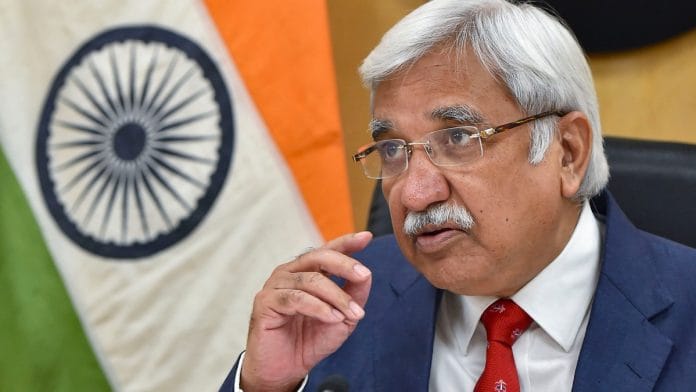New Delhi: Amid fresh revelations over the electoral bonds scheme, ThePrint has learnt that the Election Commission had once again flagged its concerns to the Narendra Modi government in July, just over a month after the Lok Sabha elections.
In a letter written by Chief Election Commissioner Sunil Arora to Law Minister Ravi Shankar Prasad on 27 July 2019, the EC reiterated its apprehensions about the scheme.
Arora had written to Prasad regarding a range of electoral reforms recommended by the EC. Along with the letter, the CEC had attached a detailed annexure of reforms still pending with the government.
Pending reforms
Among these reforms was the proposal to reintroduce the provision in the Companies Act, 2013, which allowed a company to donate a maximum of 7.5 per cent of its average three-year net profit as political donations through electoral bonds. The government had done away with this restriction after the electoral bond scheme was introduced in 2017, leading to concerns that shell companies could be set up for the sole purpose of political donations.
The EC said: “The commission has expressed its apprehension that the abolition of the provision of Section 182 (of the Companies Act) would lead to increased use of black money for political funding through shell companies.
“The commission is of the view that the earlier provisions ensured that only profit making companies with a proven track record provide donations to political parties and accordingly, it is recommended that this provision may be reintroduced.”
The government had also done away with the provision that made it mandatory for companies to disclose details of their political donations in their annual statement of accounts.
For this, the EC said, “…a provision be made in the Companies Act requiring companies to declare the party-wise contributions made by companies in the P&L A/c, so that the transparency in the fund-raising by political parties is maintained.”
The EC also reiterated its reservation regarding the amendments made to the Representation of the People Act, 1951, which allowed any donation received by a political party through electoral bonds to be out of the ambit of reporting under the contribution report “as it affects the transparency of political funding”.
In its letter dated 26 May 2017, the EC had said: “It is evident from the amendment which has been made that any donation received by a political party through electoral bonds has been taken out of the ambit of reporting under the contribution report as prescribed under Section 29 C of the RP Act, 1951, and therefore this is a retrograde step as far as transparency of donations is concerned and this proviso needs to be withdrawn.”
Serious revelations
The electoral bonds scheme is back in the news due to a spate of fresh revelations. Last week, it was reported how the Reserve Bank of India, the Election Commission and the Law Ministry were overruled by the government in the run-up to the introduction of the scheme.
The EC has consistently maintained that certain provisions of the scheme thwart transparency in political funding.
Earlier this year, it had reiterated its position in an affidavit to the Supreme Court, saying the bonds, coupled with the removal of the cap on corporate funding, will have a “serious impact” on the transparency of political funding.
Also read: Constitutional protection for commissioners, 1 candidate, 1 seat — reforms EC to push again







It is for the apex court to render a definitive judgment on this issue.